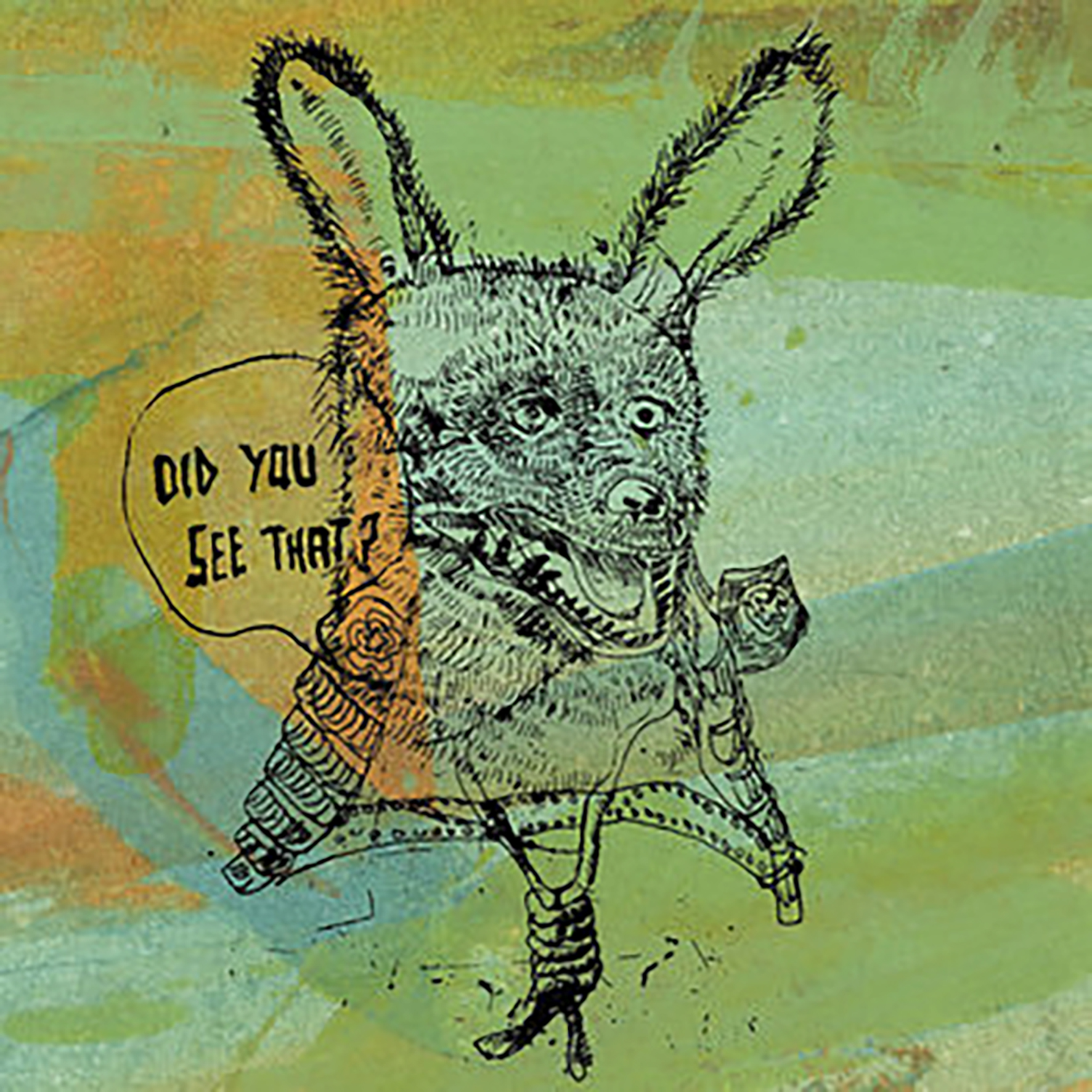
I was starting to get a little worried about Big Blood, as they went almost all of 2019 without releasing any new music. Thankfully, however, they were just quietly amassing material for not one but TWO new albums to be released in rapid succession. The first of the pair is this one, a self-released duo recording that surfaced digitally at the end of December. Obviously, they chose to give the more rocking family affair Do You Want to Have A Skeleton Dream? the more high-profile release, but that does not necessarily mean that that album got all the best songs. In fact, there are a couple of absolutely beautiful pieces on this more modest, stripped-down and fitfully ballad-centered release. Consequently, I have no doubt that there will someday be a deluxe reissue in Deep Maine's future, as it certainly deserves it. Until then, however, "A Message Sent" is an instant classic no matter which format it appears in.
I first came to Big Blood after falling in love with Fire on Fire, as the line separating the two projects was initially quite a blurry one: the ragged, psych-damaged folk aesthetic and principle songwriters were the same (Caleb Mulkerin and Colleen Kinsella), but Fire on Fire featured an expanded ensemble of talented collaborators.Naturally, having Micah Blue Smaldone and some former Cerberus Shoal bandmates along for the ride yielded some great results, yet the primary appeal of both bands has always been the songwriting.While Mulkerin and Kinsella's talents in that regard have certainly not dimmed over the last decade or so, this project has evolved into quite an idiosyncratic, unpredictable, and stylistically fluid endeavor in recent years that can be quite a different animal than either Fire on Fire or early Big Blood.I am certainly happy to follow Kinsella and Mulkerin wherever their mercurial muse leads them, but the diverging paths that their albums have taken is a significant one: some albums are thematically focused conceptual or aesthetic statements and some are just straightforward collections of good songs that harken back to their earlier strain of outsider Americana.Deep Maine is mostly an album that falls in the latter category, albeit one with some occasional detours and eccentricities.The opening "Hail the Happy Hourlings" is an especially strong example of the skewed vision that the duo brings to traditional folk/country fare, as Kinsella's lovely, lilting vocals and the simple, bittersweet piano melody are embellished with a persistently mooing cow and a woozy flute motif.It has all the hooks and melody I would expect from a classic country song, but it feels like that song is bleeding into a considerably weirder dream or hallucination without sacrificing any of its poignancy or soul.
That countrified heartache gives way to more rousing fare with the following "Baby Eyes," as Kinsella and Mulkerin's harmonized vocals lead an amiably rolling and anthemic sing-along.It is a bit too breezy to rank among my favorite Big Blood songs, but it is illustrative of some of the details that make the duo such a delightful and unique creative force.Beyond the pair's obvious talent for crafting strong hooks, "Baby Eyes" strikes a perfect balance of playful experimentation and rough, homespun charm that can only come from years of comfortably recording together.Mulkerin and Kinsella have a real genius for making their music feel wonderfully loose, unpretentious, and effortless: "Baby Eyes" is packed with cool melodic interplay, inventive arrangement flourishes, and endearing eccentricities (the wonderfully warbling backing vocals), yet it has the casual spontaneity of a song that was bashed out in a single take with no overdubs.As much as I appreciate all of those details, however, the songs themselves always remain the essence of Big Blood's greatness (though the duo's unerring instinct for not smothering those songs in overproduction or perfectionism is crucial too).In keeping with that sentiment, my favorite piece on the album is probably the most direct and minimal one of all, as "A Message Sent" is essentially just a vocal melody and a few simple piano chords.While those two elements are all Mulkerin and Kinsella need to conjure up an achingly beautiful reverie, the piece is elevated by some wonderful vocal harmonies as well as some great psychedelic flourishes in the periphery (backwards guitars, orchestral swells).Given the conspicuous absence of any country or folk influence, it almost sounds like a Flaming Lips song, but more like a highly sought-after demo version of a beloved classic than something that would wind up on a polished formal album.
The album's second half, on the other hand, is a considerably more eclectic and abstract affair.The strongest (and most endearingly weird) piece is the Kinsella-sung "The Queen and Her Court II," which features a sing-song melody that recalls a sea shanty or early English folk song.Aside from a subdued, winding organ melody, however, every other aspect of the piece is warped and hallucinatory: the vocals are distorted, the percussion is hollow and echoing, and a current of gurgling and smeared noises roils in the periphery.Elsewhere, the hypnotic repetition and mass vocals of "Serpent Skies" resemble a communal jam that some '70s hippie cult might have recorded.That piece segues nicely into the lovely and meditative closer: a reverent cover of Lloyd Cheechoo's bass-driven "James Bay" that transforms it into something approaching a hymn (Light In the Attic fans will likely recall the original from 2014's Native North America).
To some degree, the small number of songs (seven) and the stylistic variety of Deep Maine give it the feeling of an odds-and-ends collection, but that actually works in its favor, as there is not much here that sounds like business-as-usual for Big Blood (except for perhaps "Time is Coming").Also, Big Blood's orphaned songs, digressions, and covers historically tend to be every bit as likable as their formal albums (sometimes more so).Consequently, Deep Maine is quite an enjoyable batch of songs that both explores some unfamiliar stylistic threads and sneaks in a few fresh classics in the process.
Samples can be found here.
Read More

